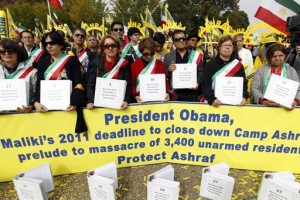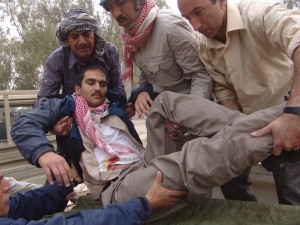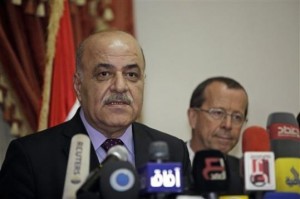THE EPOCH TIMES
UN envoy appointed to mediate dispute over Camp Ashraf
Iraq has declared that it will close Camp Ashraf by Dec. 31 and relocate—using force if necessary—the approximately 3,400 Iranian refugees who live there.

Demonstrators hold up petitions to President Barack Obama to protect the Iranian Ashraf refugee camp in Iraq during a freedom rally in front of the White House in Washington on Saturday, Oct. 22, 2011. (AP Photo/Jose Luis Magana)
Camp residents say they are willing to relocate to other countries but don’t want to be relocated within Iraq, claiming that the Iraqi government has become increasingly hostile.
The United Nations High Commissioner for Refugees (UNHRC) has received refugee applications from the exiles, but processing the claims and moving so many people will take time. An extension to the deadline has been requested.
The camp’s residents fear they will be persecuted if they remain in Iraq and face execution if they are deported to Iran.
European Union Foreign Affairs Representative Catherine Ashton has appointed Jean de Ruyt as a special envoy to advise on how the EU will respond to the issue.
At a press conference three days ago in Baghdad, an Iraqi adviser said they are sticking to their deadline. However, the Cabinet may consider moving the deadline if the UN comes up with a firm commitment to relocate the residents by a certain date.
De Ruyt said he will work with the Iraqi government to come up with a solution that is acceptable.
“The most pressing task is to pressure Iraq to remove this deadline to allow the UNHCR to do its job,” said Sharam Golestaneh with the Iran Democratic Association in Ottawa.
“In the next few days we are hoping that we can have much more activity on this issue. If we have learned one thing it’s that inaction leads to genocide and we can never let that happen again,” said Golestaneh, referring to two major raids by Iraqi forces on the camp in July 2009 and in April 2010 in which some residents were wounded and killed.
Golestaneh has concerns about the Dec. 31 deadline as it coincides with the withdrawal of the U.S. Army from Iraq. He notes that attacks on the camp have occurred even when U.S. troops were present.
“When the U.S. Army is not there and without a UN presence, what will happen to the people in the camp?” he said.
“So we say to the Iraqi government, if you are really willing to solve this issue and you don’t want the people there, then you have to work with the UN to find a workable solution and don’t enforce an impractical deadline, so they [the UN] can get the job done.”
Displaced
Camp Ashraf began in 1986 as a camp for displaced Iranians who belonged to the People’s Mujahedeen Organization of Iran, an opposition group that wanted to see democracy established in Iran.
In the 1990s the group was labeled a terrorist organization—a brand that has endured despite removal from the list by the Council of European Union and support from the British and EU parliaments.
Located north of Baghdad, Camp Ashraf has become a thorn in the side of the Iraqi government, which is endeavoring to improve relations with neighboring Iran and views the residents as terrorists.
Forty-one members of Congress have written an urgent letter to the UN Secretary- General about the need to deploy blue helmet U.N. peacekeepers to Ashraf.
Golestaneh says his group is asking the U.N. to send monitors rather than a military presence to “minimize the risk of bloodshed” at the camp.
“If the U.N. is there rather than the U.S., [the Iraqi regime] can’t see it as someone trying to impose their will on Iraq,” he says.
When the United States turned over control of the camp to Iraq in June 2009, the government said it would treat the residents humanely in accordance with its domestic and international obligations.


